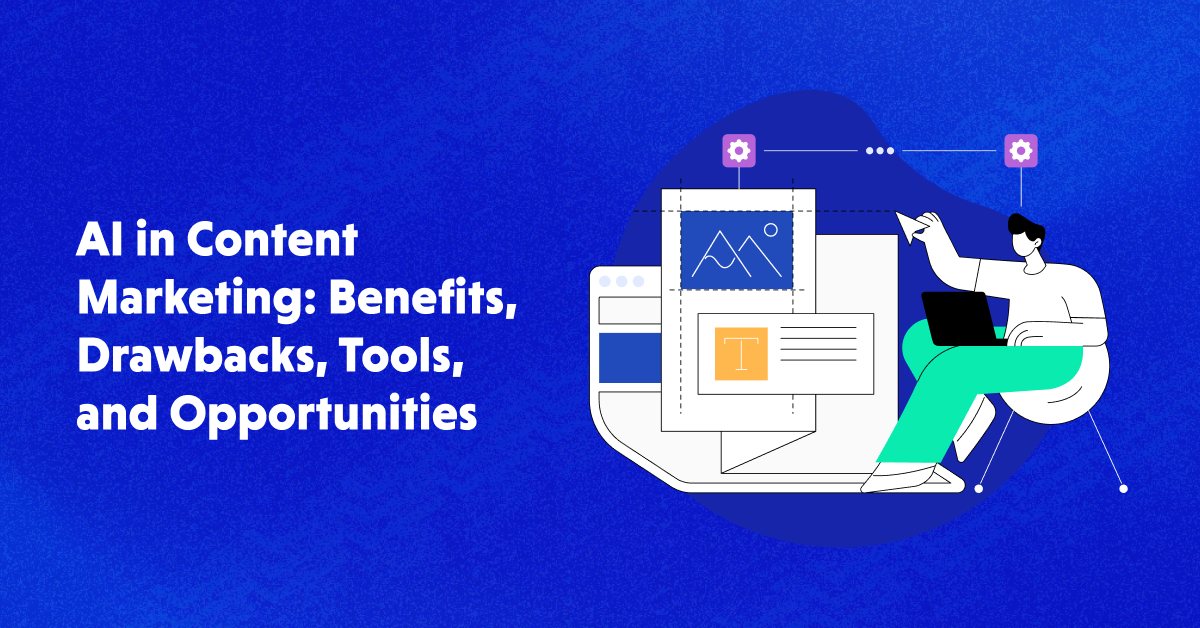Artificial Intelligence (AI) has ushered in a transformative era for businesses, particularly in the dynamic field of content marketing. The advent of AI has automated numerous manual content marketing tasks, simplifying activities ranging from keyword research and competitor analysis to content creation and distribution. According to a survey conducted by Influencer Marketing Hub, a remarkable 61.4% of marketers have already harnessed the power of AI in their marketing endeavors, with 44.4% employing it for content production. While these statistics are undeniably impressive, it’s crucial to acknowledge that AI also presents its own set of limitations. In this blog, we will delve into the advantages, disadvantages, tools, and opportunities that AI offers within the realm of content marketing.
Please note that this guest blog is contributed by Mohd Wasim Choudhury, a Senior Creative Content Writer at XpeedStudio.
AI in Content Marketing – An Overview
In today’s fast-paced business landscape, organizations are continually searching for ways to streamline their content marketing processes. These encompass content research, creation, curation, and distribution, which can prove to be immensely time-consuming when handled manually. This is precisely where the prowess of AI shines through. AI tools can partially or entirely automate content marketing processes. They possess the capacity to sift through vast volumes of data, generate personalized marketing content, and track user interactions within minutes. However, it’s vital to strike a balance rather than entirely replacing human content creators and marketers with AI. The most effective approach involves integrating AI tools into your marketing team to attain optimal results. Human intervention remains imperative for delivering AI-generated content that truly resonates with the target audience. With the right blend of human insight and strategy, AI tools can produce outstanding content.
The Evolution of AI in Content Marketing
The journey of AI in content marketing has been nothing short of remarkable. Early AI content tools primarily relied on Natural Language Processing (NLP) for tasks like keyword analysis. However, the introduction of GPT-3 marked a significant milestone, ushering in advanced content generation capabilities. Today, AI empowers personalized content creation based on audience segmentation, while also enhancing content optimization for improved SEO. AI-driven analytics furnishes invaluable insights for data-driven decision-making. As AI continues to advance, businesses gain the ability to engage their audiences more effectively. Yet, it’s crucial to maintain a delicate equilibrium between AI automation and human creativity to preserve the authenticity of content.
Does AI-Generated Content Matter to Google?
In its initial stance, Google regarded AI-generated content with skepticism, deeming it spammy and violative of its guidelines. However, in a recent update, Google clarified that not all AI content falls under the category of spam and can serve a legitimate purpose without manipulating search rankings. Google’s focus lies on useful content that exhibits expertise, experience, authoritativeness, and trustworthiness (E-E-A-T). Google advises content publishers to concentrate on creating original, high-quality, and user-centric content to attain improved rankings in search results.
Will AI Replace Human Content Writers: Fact or Fiction?
The emergence of AI writing tools naturally raises the question of whether they will eventually replace human content writers. AI technology has undoubtedly made significant strides, but it still lacks certain critical abilities and skills that human writers inherently possess. While AI tools can generate content swiftly, they cannot replicate the nuanced contextual understanding and emotional connection that human writers bring to the table. AI tools operate within defined limitations and cannot entirely supplant human content creators. Instead, AI should be seen as a valuable assistant to human writers, expediting content creation and enhancing efficiency.
AI Content Marketing Advantages
AI offers a multitude of advantages within the realm of content marketing. It can facilitate the development of highly personalized content by mining valuable audience data and tailoring content accordingly. AI-powered tools have the capacity to expedite and streamline content creation, thereby saving precious time and effort. AI optimization tools prove invaluable by offering keyword suggestions and other pertinent insights, aiding in content strategy development. Furthermore, AI can automate the collection of customer behavior data and trends, empowering data-driven decision-making.
In conclusion, AI has brought about significant advancements in content marketing, rendering processes more efficient and effective. However, it’s important to recognize that human input and creativity remain indispensable for crafting high-quality content that truly resonates with audiences. By integrating AI tools into their marketing teams, businesses can harness the immense potential of AI while upholding authenticity and delivering exceptional content.


